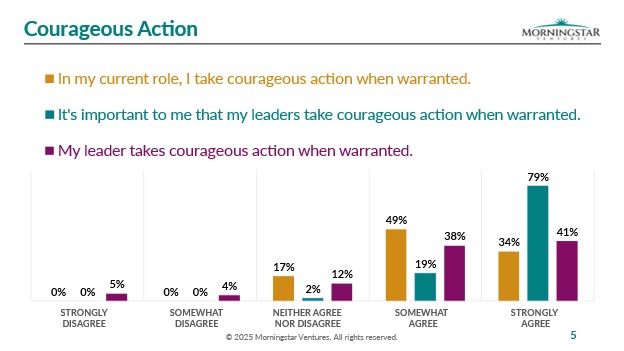When you and I get up each day and make the decision to continue to lead, it is an act of courage.
Courage has always been at the heart of leadership, and at the heart of leading change; without it there would be no change; there would only be a stuck-ness in how things are and should stay. Yet one can “lead astray,” “lead on” (in the sense of deceit), and lead others in a way that is self-serving and harmful. It takes much courage to lead toward a greater good, a selfless cause, or a just end.
Based on my work with leaders across many disciplines, for profit and nonprofit, three leadership qualities have emerged as essential in this time of enormous change—compassion, courage, and humility—and of those, courage appears as one that is critical yet most elusive, according to the research we are conducting.

I have been asking myself, “Why?” The first step in finding the answer is to define exactly what we mean by courage. What are the behaviors? Three have emerged from our work. Acknowledging Reality, Speaking Truth to Power, and Embracing Authenticity.
I have written about speaking truth to power before, (Leadership Courage: Desired, Yet Elusive) and I interviewed Dr. Tiziana Casciaro on the topic (Podcast Episode 15). Today, I want to highlight acknowledging reality, given the enormity of change this new year is bringing with it.
All of the research on courage points to the fact that acts of courage are transformational. Transformation is not simply an action. It involves one’s state of being: a physical, mental, and emotional stance. When we require change of people in organizations, we are requiring them to transform, not just “do something differently.”
Acknowledging Reality
Acknowledging reality includes feeling all of the feelings associated with change; it’s no surprise that moving through change or more correctly, transition, is akin to the process of grief: denial, anger, bargaining, depression, and finally acceptance. And, like in the process of grief, if we move through it, feeling the feelings, then we can find acceptance, even meaning, and take action anew.
During the pandemic, David Kessler, the world’s foremost expert on grief and head of the Elizabeth Kubler Ross Institute, was interviewed by Harvard Business Review and spoke about anticipatory grief, the feelings we experience when we face an unknown outcome and anticipate the worst. Isn’t that what we—and all of the people around us, on our teams, do when we know a change is coming but we don’t know exactly when, who it will impact, whose job will change, who will stay and who will go? Ruminate on all of these things, and how the work will be forever changed, and what impact that will have on those around us as well as our own personal lives?
For this month’s podcast, I asked two colleagues to talk about the practical ways we can acknowledge reality during change. They each have unique contributions. Laura Roccaforte, with deep practice in leadership and organizational development, provides a close-up look at the grief process, a personal one she would like to not have experienced but one that equipped her with the expertise to advise the rest of us when we are going through change and want to skip the messiness of the human, emotional side. Sheppard Lake, also a masterful coach, helps us deal with the not-so-useful thoughts our minds produce when it looks like the external world has failed us, in large ways and small. She offers tools for dealing with rumination and staying present—clearly essential for acknowledging reality.
I’m reminded that my first introduction to Nick Petrie’s great work on rumination was his great article entitled “Wake Up.” Acknowledging reality is a process of waking up, yet it is a process. It’s not like setting an alarm: “At 3 PM I’m going to feel motivated and confident.” Most of us need reminders, tools, and support. For me and my colleagues, that need is why we do the work we do. We would love to hear what’s working for you and what you need now.










